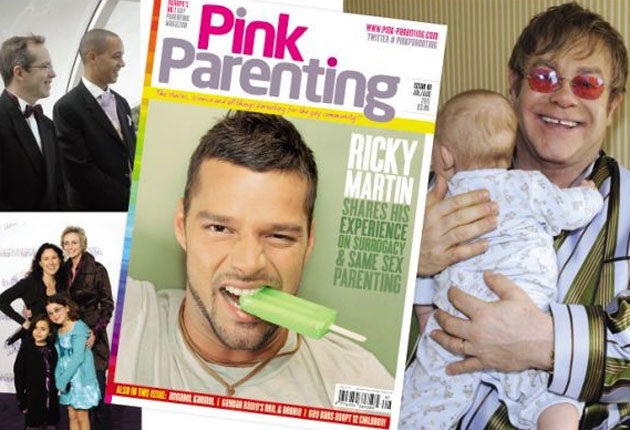Glad to be gay parents
With more same-sex celebrity couples showing off their children, is life getting easier for these unconventional families? By Lena Corner

Eleven years ago, when Karen decided to try for a baby with her long-term partner Erika, she had no idea how to go about it. She felt uncomfortable disclosing her lesbian relationship to her doctor and wasn't keen on using a sperm bank because she felt strongly that she wanted her child to know its father. In the end, a friend offered to donate sperm. "When I found out I was pregnant, I was over the moon," she says. "But back then, there wasn't any information for gay and lesbian couples, so throughout the whole thing we felt isolated and totally unaware of any legal issues which could easily have arisen."
Nowadays, things are different. We've got Elton John and David Furnish showing off their surrogate son on the front of OK! magazine. In February, we had Sex and the City's Cynthia Nixon introducing the world to the baby boy she had with her girlfriend Christine Marinoni. Glee star Jane Lynch is stepmother to two daughters from her partner Dr Lara Embry's previous relationship. And there's even a gay adoption plot brewing in EastEnders. It's now so commonplace, a bi-monthly glossy entitled Pink Parenting is due out next month.
The magazine is the creation of long-term gay couple Jeff Crockett and Giorgiou Severi, who also publish Europe's leading fertility magazine, Fertility Road. The first issue features an interview with Ricky Martin talking about his twin boys, recipes, and information for same-sex couples about adoption, fostering and surrogacy.
Over the past 50 years, we have seen a complete shift in what the model of the family looks like and it appears the rise of the gay family is going to be a big part of the next chapter. According to the Department for Education, there were 120 same-sex couples who adopted in 2010. Crockett and Severi cite figures from the 2000 American census, which revealed that 39 per cent of same-sex couples in the States between the ages of 22 and 55 were raising children. "Gay surrogacy or adoption is becoming a common-day occurrence... The world is ready for it now," Severi says.
Karen and Erika agree. After their less-than-happy experience 11 years ago, they decided to set up a website, Pride Angel, which is now the world's leading connection site putting lesbian and gay couples together with donors. It includes details of how to draw up the all-important donor or co-parenting agreements that outline financial and legal obligations. That Pride Angel now has more than 7,000 members is testament to how big this issue has become.
When Oskana decided to have a baby with her long-term partner, Stacey, they too were lucky enough to have a friend volunteer to donate sperm. They now have a two-year-old and a four-year-old, both of whom were carried by Oskana but adopted by Stacey within weeks of the birth. Now both mothers have names on the birth certificate and equal parenting rights.
Of the donor, Oskana says: "He wanted to have visibility but in a sort of 'distant uncle' kind of way. We agreed he would have no rights and no responsibilities and that he wouldn't be morally or financially obligated to do anything. We also agreed that as soon as our children should ask, we would tell them who their father is."
Stuart and Mark, who live near Manchester and have been in a civil partnership since 2008, took the adoption route. This month, the papers came through saying that the two young boys who had been placed with them since last May were officially theirs.
Even though it's now the law, in the Adoption and Children Act 2002, that same-sex couples get exactly the same rights as heterosexual couples when it comes to adoption, Stuart says he felt they were treated differently because they were gay. "We went for an open evening at Stockport Council and noticed that our names were highlighted on the attendance register but nobody else's was," Stuart says. "But once we found the right agency – After Adoption – it was superb. They were very supportive, really thorough and it wasn't an issue that we were gay."
According to research by Birkbeck College, London University and Clark University in Massachusetts, same-sex couples can make better parents than a man and a woman; because their children cannot be conceived naturally an active decision must be made either to adopt or find a sperm donor.
Alex Drummond, a cognitive-behavioural psychotherapist, says: "Children [of same-sex parents] benefit from a greater appreciation of diversity issues, more tolerance and less gender-stereotyping. But in a sense there is no difference between a good same-sex couple and a good heterosexual one. What matters is the quality of relationship and the feelings of safety the children experience. "
Subscribe to Independent Premium to bookmark this article
Want to bookmark your favourite articles and stories to read or reference later? Start your Independent Premium subscription today.

Join our commenting forum
Join thought-provoking conversations, follow other Independent readers and see their replies